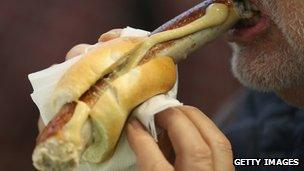Germany reports sluggish first-quarter growth of 0.1%
- Published

Germany's economy barely grew in the first quarter of 2013 as exports and investment shrank, figures show.
But higher domestic consumption - thanks to rising wages - helped offset the declines in foreign trade and capital investment, raising hopes it will help drive a sustained recovery.
Gross domestic product rose 0.1% from the previous quarter, but contracted 1.4% compared with a year earlier.
The figure showed the economy narrowly avoided falling into a recession.
In the previous quarter, Germany's annual economic output shrank by 0.7%. A recession is defined as two consecutive quarters of economic contraction.
In the latest GDP data, which confirmed a preliminary estimate, only household spending was positive, growing 0.8%. Imports fell by 2.1% and exports dropped 1.8%,
"Germany's consumers ride to the rescue," said Christian Schulz, senior economist at Berenberg Bank.
'Normal' effect
"In 2013, Germany will have to rely largely on domestic demand for growth. With consumption showing signs of strength and some bounce-back in investment after the long winter, the outlook for domestic demand is brightening," he said.
"Strong fundamentals such as low unemployment, rising wages and low inflation are starting to have their 'normal' effect. And more growth is in store,"
A separate survey of 2,000 households by market research group GfK showed consumer sentiment rose for the sixth month in a row.
GfK pointed to "the favourable and stable framework conditions in Germany. The high level of employment, favourable wage agreements and slowing inflation are buoying sentiment."
Business sentiment also showed a surprise rebound this month after two consecutive months of declines, according to the closely-watched Ifo business climate index released on Friday.
But some analysts still warned that the recovery was fragile.
Germany's economy lost steam last year as the eurozone crisis and weakness in China hit exports.
"The data also hold an inconvenient truth," said Carsten Brzeski, senior economist at ING.
"Without its exports, the German economy is currently only like a sports car without sixth gear."
- Published8 May 2013
- Published18 February 2013